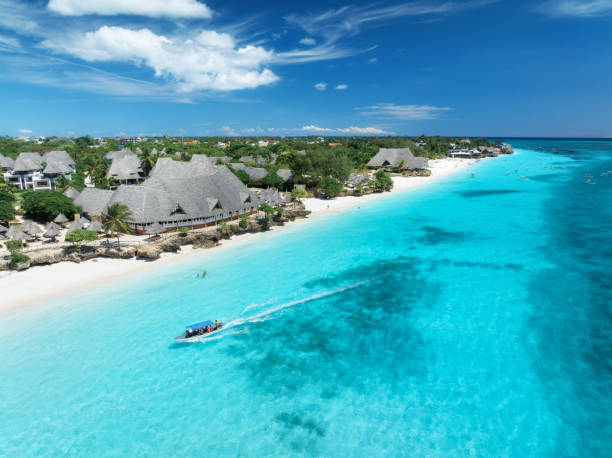Zanzibar smells like cloves and sea salt. The turquoise water looks like something from a postcard, and Stone Town’s narrow alleys whisper stories that go back centuries. But here’s what travel brochures won’t tell you: this spice island has its quirks, and knowing what to sidestep can mean the difference between a magical trip and a frustrating one.
Your friend who went last year probably came back raving about the beaches. What they might not have mentioned was that time they accidentally offended a local family or spent two days sick from sketchy prawns. These mistakes happen all the time, and they’re completely avoidable.
Let’s talk about the things you really need to watch out for so your Zanzibar adventure lives up to the hype.

Things to Avoid in Zanzibar
Zanzibar rewards travelers who respect its culture and understand its rhythms. Here are ten common mistakes that can derail your trip, along with practical ways to steer clear of them.
1. Showing Too Much Skin Outside Beach Areas
Picture this: you’re wandering through Stone Town in your beach cover-up, feeling the afternoon heat, and suddenly you notice everyone’s staring. Zanzibar is about 99% Muslim, and while the island welcomes tourists, locals expect a certain level of modesty outside resort areas and designated beaches.
This means keeping your shoulders and knees covered when you’re exploring towns, markets, or villages. Tank tops and short shorts that feel perfectly normal at home can make people uncomfortable here. Women should carry a light scarf or shawl that can quickly cover bare shoulders. Men get a bit more leeway but should still avoid going shirtless anywhere except the beach.
The beachfront hotels and resorts have different rules. You can wear your bikini by the pool or on the sand without any issues. But that ten-minute walk from your hotel to the local shop? Throw something over your swimsuit. Your respect goes a long way, and you’ll notice locals warming up to you much faster when you make the effort.
2. Drinking the Tap Water
That clear water flowing from your hotel sink might look fine, but trust me on this one—stick to bottled water. The infrastructure here hasn’t caught up with the tourism boom, and your stomach will thank you for being cautious.
This extends beyond just drinking. Use bottled water for brushing your teeth too. Ice cubes in drinks? Ask if they’re made from filtered water before accepting. Salads and fresh fruits washed in tap water can also cause problems, especially at smaller local restaurants that might not have proper filtration systems.
Some travelers try to tough it out, thinking their stomachs can handle anything. Then they spend three days of their week-long vacation in the bathroom. Not exactly the tropical paradise experience you’re paying for. Stock up on bottled water at local shops where it costs a fraction of hotel prices. A 1.5-liter bottle runs about 1,000 Tanzanian shillings (roughly 40 cents), so there’s no real reason to risk it.
3. Accepting the First Price
Here’s something that catches many Western visitors off guard: in Zanzibar’s markets and with taxi drivers, the initial price you hear is rarely the real price. Bargaining isn’t rude here. It’s expected. It’s part of how business works, and vendors actually enjoy the back-and-forth.
Start by offering about 40-50% of what they’re asking. The vendor will look shocked, maybe even a little offended, but that’s part of the dance. You’ll eventually meet somewhere in the middle, usually around 60-70% of the original price. This applies to everything from spices and textiles to taxi rides and boat tours.
There’s one big exception: restaurants and established shops with posted prices. Those are fixed. But for souvenirs, transportation, and beach vendors selling everything from fruit to paintings, bargaining is the name of the game. Some travelers feel uncomfortable with this at first. They worry about seeming cheap. But paying the inflated tourist price actually messes up the local economy and makes it harder for budget travelers who come after you.
4. Visiting During Seaweed Season
Zanzibar’s beaches look incredible in photos, and they are stunning—during the right months. But timing matters more than you’d think. Between May and July, large portions of the eastern coast are covered in seaweed due to monsoon currents and seaweed farming practices.
What looks like pristine white sand in brochures can turn into a brown, slimy mess that makes swimming nearly impossible. The smell isn’t great either. Hotels try to clear it away, but nature works faster than beach rakes. Areas like Paje, Jambiani, and parts of Nungwi see the worst of it.
If your dates are flexible, aim for December through February or August through October. These months bring clearer waters and minimal seaweed. The west coast around Stone Town and beaches like Kendwa on the north tip experience less seaweed year-round because of different current patterns. Do your research before booking that beachfront bungalow, or you might end up with a view that’s less than Instagram-worthy.
5. Leaving Valuables Unattended on the Beach
Those postcard-perfect beaches feel safe. The vibe is relaxed, everyone’s friendly, and you’re on vacation. So you head into the water for a swim, leaving your phone, wallet, and camera sitting on your towel. Bad idea.
Petty theft happens on Zanzibar beaches, especially at popular spots like Nungwi and Kendwa, where crowds provide cover. Beach boys patrol the sand selling tours and trinkets, and while most are legitimate, some work with thieves who grab unattended bags while everyone’s distracted.
The solution? Take turns swimming if you’re with someone. Use your hotel safe for passports and extra cash. Bring only what you absolutely need to the beach, and keep it in a waterproof bag you can take into the water with you. Many beachfront restaurants will watch your belongings if you’re eating there, but get someone’s name and make sure they actually agree to it first. That casual “sure, no problem” from a waiter who’s juggling twelve tables might not translate into your stuff actually being watched.
6. Ignoring Prayer Times
Five times a day, the call to prayer echoes across Zanzibar. Shops close. Restaurants pause service. Streets empty as people head to mosques. This happens at dawn, midday, mid-afternoon, sunset, and evening. The timing shifts slightly throughout the year based on the Islamic calendar.
Foreign visitors sometimes get frustrated when they can’t buy something or get service during these 15-30 minute windows. But fighting it is pointless. Plan around prayer times instead. That sunset dhow cruise? It’s scheduled after evening prayers for a reason. Need to catch a taxi? Give yourself buffer time if you’re traveling during prayer hours.
Friday midday prayers run longer, sometimes over an hour. Shops and services can be closed from roughly 12:30 PM to 2:00 PM. If you’re in Stone Town on a Friday afternoon trying to visit specific stores or offices, you’ll find yourself wandering empty streets. Save major shopping or business for other days, or embrace the pause as an excuse to find a rooftop café and watch the city breathe.
7. Falling for Common Tourist Scams
The “spice tour” costs triple what locals pay. The friendly guide who takes you to his cousin’s shop, where prices mysteriously skyrocket. The taxi driver who insists your hotel is closed and wants to take you somewhere else (where he gets a commission). These scenarios play out daily.
Beach touts are particularly persistent. They’ll offer you tours, massages, boat rides, and everything in between. Some are legitimate. Many aren’t. Always book tours through reputable companies or your hotel, even if it costs a bit more. That cheap sailing trip offered by a random guy on the beach might leave you stranded when the boat breaks down three miles offshore.
Another common one: the damage scam at scooter rentals. You rent a bike, return it, and suddenly there’s a scratch that definitely wasn’t there before (according to them). They want you to pay inflated repair costs. Combat this by taking detailed photos or videos of the scooter from every angle before you ride off. Most legitimate rental places will appreciate your thoroughness.
Trust your gut. If something feels off, it probably is. Zanzibar has plenty of honest locals running good businesses. You don’t need to be paranoid, just aware.
8. Eating Risky Street Food
Forodhani Gardens in Stone Town fills up every evening with food stalls selling grilled seafood, Zanzibar pizza, sugarcane juice, and all sorts of local specialties. The smoke from charcoal grills mixes with ocean air, and everything smells amazing. But approach with caution.
Fresh-grilled items that are cooked right in front of you are generally safe. That whole fish coming straight off the coals? Probably fine. The prawns that have been sitting out for who knows how long? Skip them. Shellfish in tropical heat is a gamble you don’t want to take unless you can see they’re fresh and properly stored.
Look for stalls with lots of locals eating there. Busy places turn over food quickly, which means fresher ingredients. Avoid anything with mayonnaise or dairy-based sauces that have been sitting unrefrigerated. Ice cream from street carts that don’t have proper freezers can also cause problems.
This doesn’t mean avoiding local food entirely. Some of my best meals in Zanzibar came from small local spots. Just be smart about it. Watch for cleanliness, choose wisely, and maybe save the adventurous eating for earlier in your trip so you have time to recover if something doesn’t agree with you.
9. Disrespecting Wildlife and Marine Life
Swimming with dolphins sounds magical until you see thirty boats chasing a pod of exhausted animals. Tours off Kizimkazi in southern Zanzibar advertise guaranteed dolphin encounters, but this often means aggressive boat drivers harassing wildlife until tourists get their photos. The dolphins show clear signs of stress, changing their behavior patterns and abandoning traditional feeding grounds.
Similar issues plague turtle sanctuaries and some marine parks. Places that let you hold sea turtles or touch coral might seem interactive and fun, but you’re actually damaging fragile ecosystems. Coral takes decades to grow, and a single careless fin kick can destroy years of development. Turtle hatchlings imprint on handling, which reduces their survival rates.
Choose operators certified by marine conservation groups. Keep a distance from wildlife. Never touch or feed animals. If a tour promises guaranteed close encounters with any wild species, that’s a red flag. Responsible operators understand that wildlife viewing means patience and respect, not harassment. Mnemba Atoll offers incredible snorkeling where you might see dolphins, turtles, and rays in their natural habitat. These encounters mean infinitely more than staged interactions.
10. Skipping Travel Insurance
You’re young, healthy, and careful. What could go wrong? Well, quite a bit actually. Medical facilities on Zanzibar are limited. Serious injuries or illnesses often require evacuation to Dar es Salaam or Nairobi. That helicopter ride costs upwards of $20,000 if you’re paying out of pocket.
Even minor issues get expensive fast. A bad case of food poisoning requiring IV fluids and medication can run several hundred dollars. Scooter accidents happen regularly, especially on sandy roads where tourists aren’t used to riding. A broken bone means serious medical bills, plus potentially changing your flight home.
Good travel insurance costs maybe $50-100 for a week-long trip. That’s a cheap peace of mind. Make sure your policy covers medical evacuation, trip cancellation, and adventure activities if you plan on diving, kitesurfing, or other water sports. Some credit cards include travel insurance, but read the fine print. Coverage limits and exclusions vary wildly.
One friend went without insurance and ended up with a severe infection from a coral cut. Three days in a Nairobi hospital plus flights home early cost him over $8,000. His entire trip budget was $2,500. Don’t be that person.
Wrapping Up
Zanzibar rewards travelers who do their homework. The island offers incredible experiences—snorkeling in crystal water, getting lost in Stone Town’s maze of alleys, and tasting perfectly spiced biryani at sunset. But it’s also a place where cultural sensitivity and practical awareness make all the difference.
Keep these ten things in mind, respect local customs, stay alert without being paranoid, and you’ll create memories that match those gorgeous photos. Your Zanzibar story can be one of connection and discovery rather than frustration and mishaps. Pack smart, think ahead, and let the island work its magic on you.


